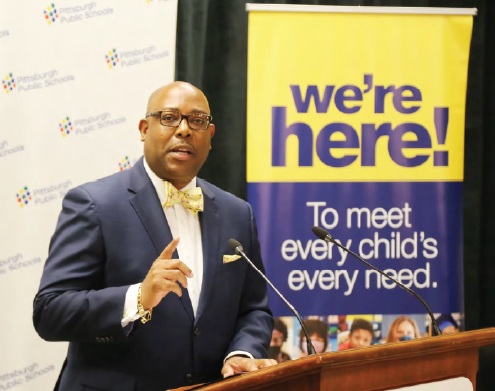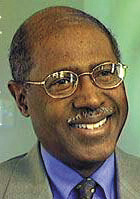PPS SUPERINTENDENT WAYNE WALTERS, shown in this 2022 photo in his first few days as superintendent. Three years in, how will he fix the problem of declining enrollment while trying to keep equity for all students in PPS? (Photo by Emma Folts/PublicSource/File)
The thought of closing 10 school buildings and 14 schools overall within the Pittsburgh Public Schools system, especially the thought of closing Conroy, a school that helps students with special needs, and moving it to another location, had more than a hundred people steaming at a PPS Board public hearing, Monday, March 24.
But two days later, when it was time for the PPS Board of Directors to vote on “opening the state-required public comment period related to proposed school closures,” PPS Superintendent Dr. Wayne Walters held up the STOP sign.
He asked the board on Wednesday, March 26, to postpone its vote, allowing more time for further analysis and to “incorporate information requested by the board into the district’s Feasibility Report,” according to a press release from PPS, March 26.
In layman terms, the parents, students and teachers who wanted the vote to be tabled until further notice won out. Some parents who spoke at the March 24 meeting disparaged Dr. Walters for, in their eyes, rushing the idea of school closures to the board for a vote, without properly explaining to some parents all of the parameters involved. Some parents just don’t like the idea of closing so many schools altogether, especially Conroy. Under Dr. Walters’ plan, Conroy, which is in Manchester, would close and the students would move to the vacated South Brook building in Brookline.
No, no, no, no, said people like Conroy school nurse Regan Konesky, Conroy parent Taran Alford, and Conroy parent Shareena Johnson.
So many people spoke at the March 24 meeting in opposition to Dr. Walters’ plan, that the Board of Directors could have had dinner and a late night snack at the Board of Education Building in Oakland.

PPS SUPERINTENDENT DR. WAYNE WALTERS
In a press release, Dr. Walters said that the plan to close the schools had added to the already-broken trust between the district and its constituents. “We cannot ignore the impact that the erosion of trust has had on our relationship with members of the Pittsburgh Public Schools community. While this breakdown has a long history, I fully accept the responsibility of helping to restore it,” Dr. Walters said. “Removing this item from the agenda reflects our commitment to being both responsive and accountable—to the board and to the public.”
If the board would have voted on the issue on Wednesday, March 26, how would the vote have turned out? There are nine board directors (members are referred to as directors), and the Courier, through interviews with some of the board directors, has learned that it would have been a close vote. The Courier has learned exclusively that there would have been at least four “no” votes, meaning not to start the “process” of closing schools (known legally as opening the state-required public comment period). Sala Udin, the longtime Pittsburgh community stalwart who is also a PPS Board Director, kept his vote choice close to the vest. He possibly could have been the fifth “no” vote or the fifth “yes” vote. Five votes for “yes” or “no” are all that’s needed.

PITTSBURGH RESIDENT NOEL WEBB is against Pittsburgh Public Schools closing any schools without the district unveiling a fully detailed plan. She spoke to the superintendent and board directors at the March 24 public hearing. (Photo by Rob Taylor Jr.)
The national consulting firm Education Resource Strategies gave recommendations to PPS regarding the district’s use of facilities. PPS said the recommendations were the result of six months of research and extensive community engagement. After the recommendations were reviewed by PPS leadership, Dr. Walters, in late February, took the steps to get the ball rolling on the recommendations to close 14 schools and change the grade configurations to the more traditional K-5, 6-8 and 9-12.
Some of the schools that were on the chopping block included King PreK-8, Spring Hill K-5, Allegheny 6-8, Manchester PreK-8, Schiller 6-8, Morrow PreK-8 and Miller PreK-5.
The problem that PPS faces is dire. There are less than 20,000 students in the district, a district designed to serve 40,000. There are five schools that currently have less than 150 students, and 16 schools total with less than 250 students, “enrollment levels that make it challenging to provide comprehensive academic and extracurricular learning,” said a PPS press release, March 26.
Still, “closing community schools without a solid plan will have a devastating effect on our children,” said Noel Webb with the organization 412 Justice. She said that statement directly to the superintendent and board directors on March 24.
She then spoke to the New Pittsburgh Courier.
“You’re closing schools without having a full plan that is transparent to everyone,” she said of the district. “You’re closing a lot of the community schools. I grew up in a neighborhood (Hill District) where I had six choices of neighborhood schools. That same neighborhood is down to one for elementary and one for middle school…and a lot of the schools that they’re changing, we don’t know what the feeder school’s going to be, so a lot of these parents are stuck.”
“I understand the challenge of developing a plan that brings comfort to everyone, and I recognize that we likely will not reach a final version that satisfies all perspectives,” said Dr. Walters in the March 26 press release sent to the Courier. “While I cannot promise that every voice will agree with the outcome, I can promise that I will always put students first. For me, that means ensuring every student, no matter their zip code, has access to the high-quality education they deserve.”

